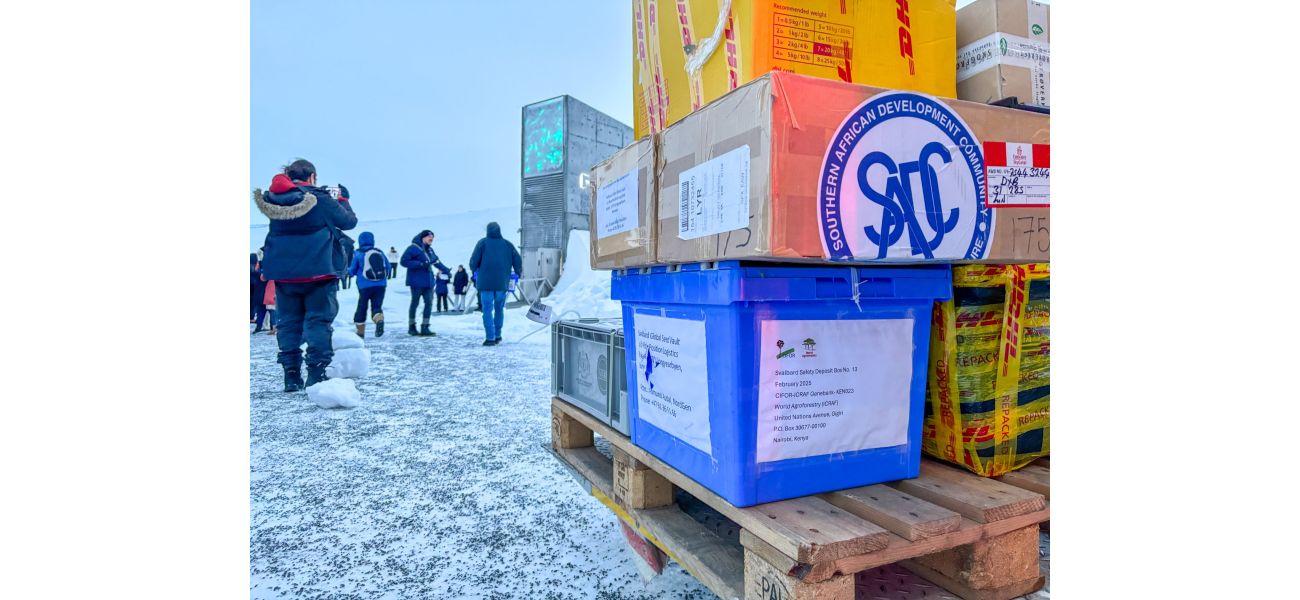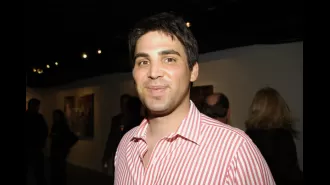The Antarctic vault for seeds receives new seed delivery.
A seed bank on Svalbard Island, Norway, has 1.25 million samples from almost all nations since its opening in 2008.
March 3rd 2025.

A new shipment of seeds has just arrived at the vault, marking a significant step in preserving the future of plant species on our planet. Over 120,000 seeds have been carefully transported to the Svalbard Global Seed Vault in the Antarctic, also known as the 'Doomsday vault'. This unique facility, located on the Norwegian island of Svalbard, has been in operation since 2008 and currently houses a staggering 1.25 million seed samples from almost every country in the world.
Just last month, the latest delivery of seeds made its way to the icy island, bringing the total number of stored seeds to over 1 million. This vault serves as a last resort for safeguarding the agricultural biodiversity of our planet. Nestled into the side of a mountain, it offers protection against threats such as climate change, war, and natural disasters. Its impressive collection includes seeds from a vast range of countries, ensuring the conservation of vital crops for future generations.
According to Éliane Ubalijoro, CEO of the Center for International Forestry Research and World Agroforestry, this latest deposit is a pivotal moment in securing the future of native tree species. She highlights the significance of the African baobab, also known as the 'Tree of Life', and its essential role in providing food, medicine, and economic benefits to millions of people. Other species recently added to the vault play a crucial role in restoring soil health, sequestering carbon, and supporting sustainable agroforestry practices.
The seeds are carefully stored in airtight aluminium bags, with each bag containing an average of 500 seeds. The entire construction cost of the Seed Vault, approximately 45 million Norwegian krone, was fully funded by the Norwegian government. Although the vault officially opened in 2008, the first batch of seeds arrived in January of that year. Surprisingly, there are no permanent staff on-site, making this facility a truly remarkable feat of engineering and technology.
In 2020, King Charles made a significant contribution to the vault by sending rare seeds from one of his estates. These wild plant seeds were hand-picked from meadows at his residence, Highgrove, and represent species that are disappearing from the UK landscape. In a statement, Charles emphasized the importance of preserving the diversity of flora and fauna, which ultimately sustains our survival on this planet. He has been actively involved in this cause since he arrived at Highgrove 40 years ago.
The Svalbard Global Seed Vault is not just a storage facility; it is a symbol of hope for our planet's future. With its ever-growing collection of seeds, it serves as a vital resource for protecting our planet's biodiversity against the ever-increasing threats we face.
Just last month, the latest delivery of seeds made its way to the icy island, bringing the total number of stored seeds to over 1 million. This vault serves as a last resort for safeguarding the agricultural biodiversity of our planet. Nestled into the side of a mountain, it offers protection against threats such as climate change, war, and natural disasters. Its impressive collection includes seeds from a vast range of countries, ensuring the conservation of vital crops for future generations.
According to Éliane Ubalijoro, CEO of the Center for International Forestry Research and World Agroforestry, this latest deposit is a pivotal moment in securing the future of native tree species. She highlights the significance of the African baobab, also known as the 'Tree of Life', and its essential role in providing food, medicine, and economic benefits to millions of people. Other species recently added to the vault play a crucial role in restoring soil health, sequestering carbon, and supporting sustainable agroforestry practices.
The seeds are carefully stored in airtight aluminium bags, with each bag containing an average of 500 seeds. The entire construction cost of the Seed Vault, approximately 45 million Norwegian krone, was fully funded by the Norwegian government. Although the vault officially opened in 2008, the first batch of seeds arrived in January of that year. Surprisingly, there are no permanent staff on-site, making this facility a truly remarkable feat of engineering and technology.
In 2020, King Charles made a significant contribution to the vault by sending rare seeds from one of his estates. These wild plant seeds were hand-picked from meadows at his residence, Highgrove, and represent species that are disappearing from the UK landscape. In a statement, Charles emphasized the importance of preserving the diversity of flora and fauna, which ultimately sustains our survival on this planet. He has been actively involved in this cause since he arrived at Highgrove 40 years ago.
The Svalbard Global Seed Vault is not just a storage facility; it is a symbol of hope for our planet's future. With its ever-growing collection of seeds, it serves as a vital resource for protecting our planet's biodiversity against the ever-increasing threats we face.
[This article has been trending online recently and has been generated with AI. Your feed is customized.]
[Generative AI is experimental.]
0
0
Submit Comment





